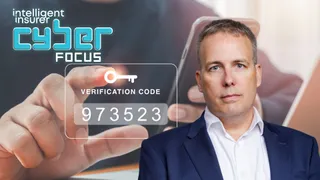
Ransomware and breaches in 2025: what attackers are doing – and why insurers should care
Investment in proprietary technology is helping to refine its digital forensics practice to stay one step ahead of cyber crime, says Anthony Hess, Asceris.
Cyber threats evolve at a breakneck pace, however companies such as Asceris are carving out unique spaces in digital forensics and incident response.
CEO Anthony Hess spoke exclusively to Intelligent Insurer about his company's distinct approach and the evolution of cyber insurance.
“We’re very focused on providing high-quality client services, particularly in the insurance sector,” Hess began, “and we’ve created a great culture that’s oriented toward quality and service,” he noted.
Launching during the Covid-19 pandemic as a fully remote company has also shaped its operational ethos.
“We’re built to be remote, so it opens up a lot of opportunities, especially when some companies are forcing staff back to the office,” he said.
“We have people literally all around the world: we're bigger than you might think, and offer more services than you might think too.”
One of Asceris’ standout capabilities is its “follow-the-sun” model, which enables continuous casework across time zones.
“We can launch a case in the US, have it worked on there, pick it up from Asia, transfer it to Europe to be further developed, and then back to the US,” Hess explained.
Resilience
Discussing current market dynamics, Hess expressed concern over the “aggressive softening” of the cyber insurance market.
“It undermines all the progress we’ve made over the last few years in tightening underwriting standards and pushing more cyber risk management down the chain,” he said.
From a technical perspective, Hess sees ongoing challenges in ransomware and email compromise. “We read how ransomware is always changing, but the fundamental way to respond to it remains the same,” he stated.
“It’s still about cyber resilience: companies still need to be asking themselves if they are ready to be attacked. Have they planned for it? Do they have tested backups, immutable and offsite?”
Hess then highlighted the increasing sophistication of business email compromise, talking about phishing kits that take into account MFA (multi-factor authentication).
“They’re trying to compromise the MFA and steal your codes,” Hess said. “Now it’s not just about having MFA; it’s about how secure your MFA is.”
“Now it’s not just about having an MFA; it’s about how secure your MFA is.”
Innovation
To combat the growing sophistication of cyber terror tactics, Asceris has invested heavily in proprietary technology to stay ahead of these challenges.
‘Asceris can look at your system and focus on the specific threats you’re facing, while eliminating the hundreds of threats that don’t need to be addressed,” Hess explained.
“We can concentrate on exactly what the attackers are doing.”
Hess also highlighted the maturity of Asceris’ digital forensics practice while pointing to rapid advancements in email security: “We’ve recently helped a lot of clients secure their MS365 environments,” he added.
The use of cutting-edge technology has certainly helped propel Asceris into the market.
“We’ve always had a focus on automation and developing different tools, especially around email,” Hess said. Using AI for data mining or machine learning has a lot of promise in reducing the cost of data breaches.”
Collaboration
Reflecting on the next phase of cyber insurance, Hess noted a shift toward integrated service models. “You’re no longer just selling a policy; you’re selling a product and a service,” he said.
“Sometimes the service is in house and insurers are building technical platforms to engage with SMEs. But that’s not the only way to go.”
Hess sees an opportunity for insurers to differentiate through strategic partnerships: “The successful insurers are the ones saying: ‘We’re going to work with partners, communicate with the insureds, and fight for market share.’”
Looking ahead, Asceris is geared towards global expansion and helping the insurance and legal markets. Hess said: “We are very much focused on and understand the insurance market and want to be there to support our partners. As we are a small, agile business, we can take revenue from one place and use it to jump ahead and support insurers looking to launch in new geographies.”
He believes the key to success lies in collaboration and innovation. “The evolution is in the middle ground,” he concluded. “It’s about working effectively with partners and communicating the immense value cyber insurance provides.
“That’s how we drive adoption and ensure resilience in the face of ever-changing risks.”
Did you get value from this story? Sign up to our free daily newsletters and get stories like this sent straight to your inbox.
Editor's picks
Editor's picks
More articles
Copyright © intelligentinsurer.com 2024 | Headless Content Management with Blaze

.jpg/r%5Bwidth%5D=320&r%5Bheight%5D=180/b85cbca0-0284-11f1-bb2d-e570f9b5e337-II%20News%20-%20Aditi%20(8).webp)